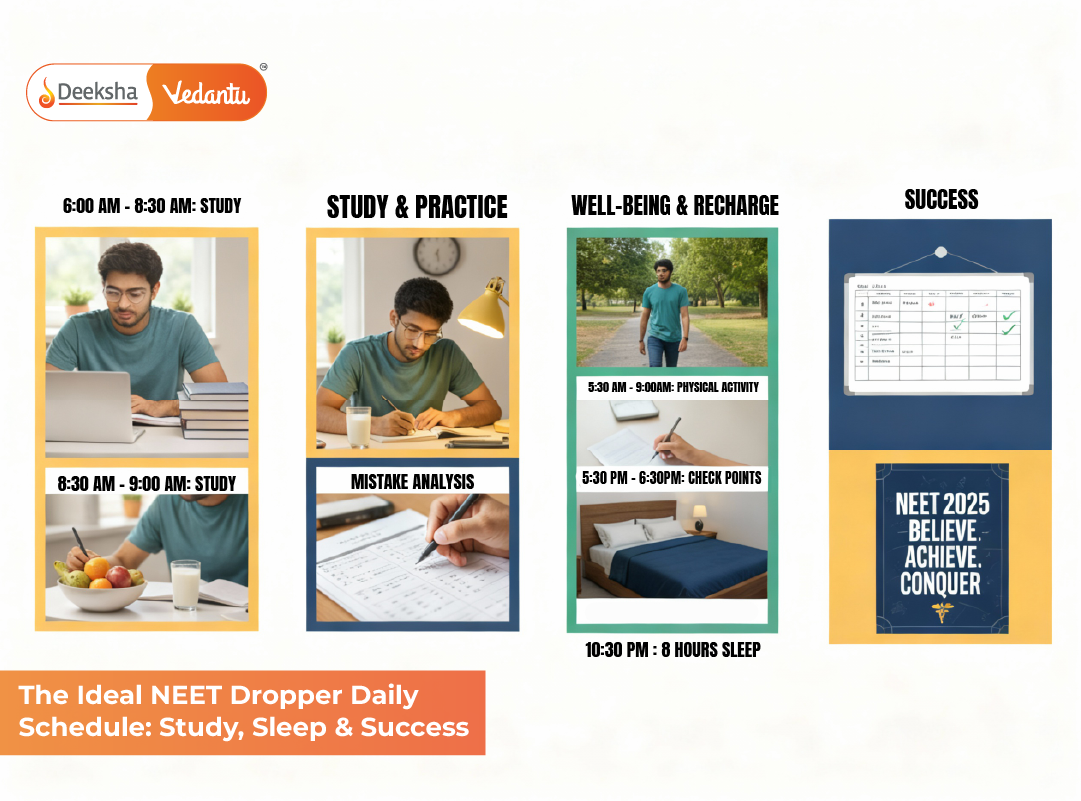NEET is one of India’s toughest medical entrance exams, with over 20 lakh aspirants competing for a limited number of MBBS and BDS seats. For students aiming to crack NEET 2026 on their very first attempt, strategic preparation is non-negotiable. While the syllabus may appear vast, success lies in disciplined planning, consistency, and guided mentorship.
At Deeksha Vedantu, we’ve supported thousands of first-time aspirants who cracked NEET with confidence. This blog serves as your complete NEET 2026 blueprint, breaking down each step you need to take to clear the exam on your first try.
Explore Deeksha Vedantu Long Term NEET Coaching to boost your NEET Scores today.
Start with the Right Mindset
Before opening a textbook, develop the mindset of a NEET topper. Believe in your ability to clear the exam on the first attempt. Confidence, combined with structured discipline, fuels progress.
- Set a clear, meaningful goal – like getting into AIIMS, JIPMER, or a top government medical college.
- Visualise your success regularly.
- Create an environment that limits distractions and boosts focus.
- Track your progress weekly to build momentum and confidence.
Understand the NEET 2026 Exam Structure
Understanding the structure of NEET allows you to plan your approach efficiently.
- Subjects Covered: Physics, Chemistry, Biology (Botany + Zoology)
- Sections: Each subject has two sections – Section A (35 questions), Section B (15 questions; answer any 10)
- Question Pattern: Total of 200 questions; 180 to be attempted
- Marking Scheme: +4 for each correct answer, -1 for each incorrect one
- Total Marks: 720
- Duration: 3 hours 20 minutes
Subject-Wise Preparation Strategy
1. Biology – The Scoring Giant
- Focus: NCERT is the Bible. Nearly 85-90% of questions come directly or indirectly from NCERT.
- Method:
- Read NCERT line-by-line multiple times.
- Highlight and annotate margins.
- Memorise diagrams, classification tables, and scientific names.
- Practice high-weightage chapters like Human Physiology, Plant Physiology, Genetics, Ecology, and Reproduction.
- Practice: Solve 100+ MCQs per chapter and complete one PYQ booklet.
2. Chemistry – Concept + Memory Balance
- Physical Chemistry:
- Focus on concepts like mole concept, thermodynamics, equilibrium, and electrochemistry.
- Practice 20 numericals daily.
- Organic Chemistry:
- Master mechanisms of key reactions.
- Create a notebook of named reactions and exceptions.
- Use flowcharts to revise.
- Inorganic Chemistry:
- Stick to NCERT completely.
- Use mnemonics for block elements and periodic trends.
- Revise from mind maps and self-made tables.
3. Physics – Conceptual Clarity + Daily Practice
- Build Fundamentals: Focus on mechanics, optics, thermodynamics, and electricity.
- Problem Solving: Solve 30–40 MCQs daily from mixed topics.
- Formula Revision: Maintain a separate formula book.
- Visualisation: Use animation videos or simulations to understand abstract concepts.
- PYQ Practice: Identify recurring problem patterns from previous years.
Create a Realistic & Smart Study Plan
- Study Hours: Begin with 6–7 hours/day; increase gradually to 10 during revision months.
- Phase 1 (Jun–Oct 2025): Focus on Class 11 NCERT completion with concept building.
- Phase 2 (Nov–Feb 2026): Complete Class 12 NCERT and start mixed topic MCQ solving.
- Phase 3 (Mar–Apr 2026): Dedicated full-syllabus revision and mock test phase.
Daily Plan Sample:
- Morning (2 hrs): Revise Biology with NCERT and MCQs
- Midday (2 hrs): Study Chemistry (Inorganic/Physical)
- Evening (3 hrs): Practice Physics problems
- Night (1 hr): Review formulae, mistakes, and plan next day
Mock Tests & Previous Year Questions – The Real Game Changers
- Begin weekly mock tests from November 2025.
- Increase to bi-weekly mocks by January and 3 per week in April.
- Review mistakes thoroughly; note them down and revise before the next test.
- Solve the last 10 years of NEET question papers and match them to your chapter prep.
- Use OMR sheets while practicing to simulate real exam pressure.
Revision Techniques That Work
- Short Notes: Summarise every chapter in 1-2 pages for Biology and Chemistry.
- Flashcards: Create cards for frequently forgotten facts and reactions.
- Weekly Recap: Dedicate one day weekly for revision only.
- Mind Maps: Visualise difficult chapters using flowcharts and color codes.
- Group Quizzes: Use peer learning for fast recall.
How Deeksha Vedantu Supports Your First-Attempt Success
At Deeksha Vedantu, NEET isn’t just an exam – it’s a journey. Here’s how we support every step:
- Expert Faculty: Our NEET teaching team brings deep subject knowledge and exam-specific insights.
- Integrated Curriculum: Synchronised with your PU syllabus to help you prepare for both board and NEET exams simultaneously.
- Performance Analytics: Regular assessments, rank tracking, and personalised test analysis.
- Doubt Clearing: One-on-one mentoring, doubt sessions, and post-class query resolution.
- Study Resources: NCERT-centric notes, daily practice problems, and advanced mock test series.
- Holistic Mentorship: Emotional support, motivational sessions, and career guidance.
Check out our NEET Residential Coaching option for focused preparation.
FAQs
1. Can I crack NEET 2026 in the first attempt without coaching?
Yes, it’s possible with self-study and the right resources. However, structured coaching like Deeksha Vedantu provides expert strategies, curated notes, and a disciplined ecosystem that significantly increases success chances.
2. Is NCERT enough for NEET Biology?
Absolutely. But you must study it deeply—understand diagrams, scientific names, and figure-based questions.
3. How many mock tests are ideal before NEET?
Aim for at least 20–25 full syllabus mock tests with detailed analysis. This ensures time management, question familiarity, and reduced anxiety.
4. How to handle burnout during long prep months?
Take weekly breaks. Use active techniques like Pomodoro. Engage in light exercise, stay socially connected, and attend motivational sessions.
5. When should I start solving PYQs?
Start chapter-wise PYQs immediately after completing a topic. Begin full-length PYQs once 50% of the syllabus is done.
Conclusion
Cracking NEET 2026 in your first attempt isn’t about memorising everything—it’s about following a focused plan, staying consistent, and learning from every mistake. Thousands of students have done it before—and so can you.
Deeksha Vedantu’s NEET support system—designed for integrated learning, constant mentorship, and strategic feedback—ensures that your first attempt is your best attempt. If you’re serious about NEET 2026, we’re serious about getting you there.
Table of Contents










Get Social